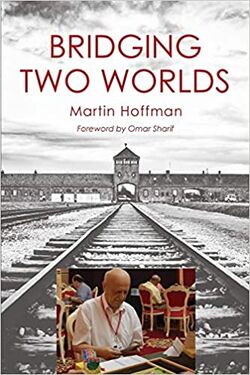Samuel Hoffman / Martin Hoffman (M / Czechia, 1929-2018), Holocaust survivor
Samuel Hoffman / Martin Hoffman (M / Czechia, 1929-2018), Holocaust survivor
- KEYWORDS : <Auschwitz> <Buchenwald> <Liberation of Buchenwald> -- <Czechia> <Windermere Children> <England>
- MEMOIRS : Bridging Two Worlds (2019)
Biography
Samuel Hoffman was born November 15, 1929 in Prague, Czechia. In 1944 he was deported to Auschwitz, and from there to Monowitz-Buna. He survived a death march towards Buchenwald, where he remained until liberation.
After liberation, he went to back to Prague. In August 1945 he joined the Windermere Children and went to England. As an adult he became a famous professional bridge player.
Book : Bridging Two Worlds (2019)
This is a rare account of the horrors of the WW2 death camps from someone who experienced them. Born into an Orthodox Jewish family in Prague, Hoffman lost his entire family in the Holocaust. Fourteen-year-old Martin Hoffman escapes immediate death on arrival at Auschwitz by claiming to be eighteen. Through a combination of chutzpah and luck, he first survives a year at Auschwitz, then the Death March to Buchenwald, and stays alive until the camp is liberated by American troops.
After relocating to England, Hoffman is tortured by survivor's guilt, which leads to episodes of deep depression. He learns a trade (diamond-cutting), but eventually discovers two things: a talent for bridge, and a fascination with gambling. As he finds success with the first, becoming a world-class professional player, the second almost destroys him.
It is only later in life, with the help of his wife Audrey, that Hoffman is able to overcome his dark memories, conquer his addiction to gambling, and finally find contentment in a new life in Florida.
USHMM Oral Interview
Martin Josef Hoffman, born in 1929 in Prague, Czech Republic, describes his family; his neighborhood; his education and health problems; reasons for his move to live with relatives in the Carpathian Mountains; the Jewish and Russian Christian communities; the Hungarian occupation of the Carpathian region in Czechoslovakia from 1939 to 1940; the effects of the Hungarian occupation; his parents' fate in Prague; the food situation; the confiscation of Jewish businesses; his opinion of Hitler's attitude to Jews; the restrictions on education; his religious life; living in Budapest, Hungary from 1940 to 1944; his failure to emigrate in 1940; support from Jewish community; daily life in the city; hearing stories of German antisemitic atrocities; the German occupation of Hungary in 1944 and the reaction of Jewish community; the contrasts between Hungarian and German attitudes towards Jews; his deportation from Budapest to Auschwitz in early 1944; the journey there and not knowing his fate; the reception in Birkenau and Auschwitz and the selection process; his initial impressions of the camp; being shaved and receiving an uniform; the role of Kapos; avoiding classification as a child; conditions in the camp; being an inmate in Buna Monowitz in 1944; his daily routine and conditions in the camp; the attempted rape by a Kapo and consequences; his efforts to avoid work; being selected for engineering training; the health situation; the medical facilities and the fate of the chronically sick; the lack of hygiene; the mental state of inmates; the guards’ willingness to shoot inmates; the role and nature of Kapos; recreation; rumors of German defeats; the political and criminal inmates; relations with other inmates; the abandonment of religious dietary laws; the loss of faith; mental attitudes; his selection for gate duties and his consequent transfer to Glewitz; his daily routine at the gate; the barrack accommodations; the cruelty of Kapos; the hanging of inmate escapees; varying degrees of brutality of different SS camp commandants; work duties; the story of being given a meal by a German Army officer; the evacuation of camp in February 1945 and the journey from Glewitz to Buchenwald; the death march and the execution of inmates falling out; the varying behavior of German guards; their interval at Gross-Rosen; being loaded into cattle trucks; the effects of hunger; the casualties amongst the prisoners; life in Buchenwald, including the conditions and death rate; being transferred to the main camp for kitchen duties; the German Communist Kapos; his efforts to aid friends; the avoidance of a second death march; staying in camp as after the evacuation; being liberated by United States troops in April 1945; the German resistance in the nearby woods; moving to SS quarters and bartering with US troops; being a displaced person in Czechoslovakia and Germany in 1945; returning to Prague to search for his family; his role as a mascot with a US Army unit in Germany; his second return to Prague; immigrating to Great Britain; the free travel for former inmates; the long term effects of his experience and his attitude towards Germans; his refusal to take reprisals against Germans; and the capture of SS guards during liberation and the treatment of former Kapos.
